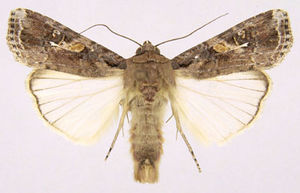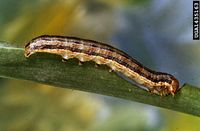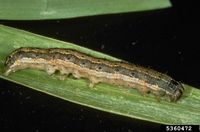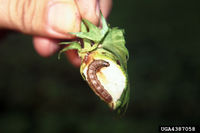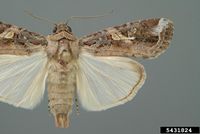Difference between revisions of "Spodoptera frugiperda"
| Line 6: | Line 6: | ||
{{VN | {{VN | ||
|en=fall armyworm | |en=fall armyworm | ||
| − | |es=gusano cogollero | + | |es=gusano cogollero del maíz |
|fr=légionnaire d'automne | |fr=légionnaire d'automne | ||
|pt=bicho-de-rumo<br/>lagarta-da-folha-do-milho<br/>lagarta-do-cartucho | |pt=bicho-de-rumo<br/>lagarta-da-folha-do-milho<br/>lagarta-do-cartucho | ||
Revision as of 12:00, 9 January 2014
Taxonomic position
|
|---|
| Literature database |
|---|
| 1100 articles sorted by: |
| • year (recent ones first) |
| • research topics |
| • countries/regions |
| • host plants |
| • list of natural enemies |
Spodoptera frugiperda (J.E. Smith, 1797) (fall armyworm)
is a serious pest of maize, turf and other crops in the American tropics and subtropics. It can cause outbreaks, defoliation and significant crop losses. The moths migrate to temperate regions during the spring and summer, but cannot survive long periods of cold temperature. The caterpillars feed on the young leaves and whorls. They might destroy the growing point of the plant. The larvae have a variable colour, green to brownish, with black, lateral stripes and grow to a length of 3-4½ cm. The adults are greyish-brown. The males are darker than the females and have a distinct pattern on the forewing. The hindwings are whitish with a brown outer margin and brown veins (in contrast to some related species). The wingspan is 3-4 cm. The life cycle from egg, through 5-6 larval stages, to mature adult lasts around 2 months. Two morphologically identical strains can be separated based on their preference for either maize and sorghum (corn strain) or rice and forage grasses (rice strain).
| Vernacular names | |
|---|---|
| • English: | fall armyworm |
| • Español: | gusano cogollero del maíz |
| • Français: | légionnaire d'automne |
| • Português: | bicho-de-rumo lagarta-da-folha-do-milho lagarta-do-cartucho |
For details see the respective page in BugwoodWiki.
The literature database currently contains 1100 publications for Spodoptera frugiperda. (See box above/on left.)
- Other images of Spodoptera frugiperda (IPM Images - click to enlarge)
